ADVENT: HOW DOES A WEARY WORLD REJOICE?
10:30AM ONLINE SUNDAY WORSHIP (fairportumc.org)
9:00AM & 10:30AM IN-PERSON SUNDAY WORSHIP
(31 West Church Street, Fairport, NY 14450)
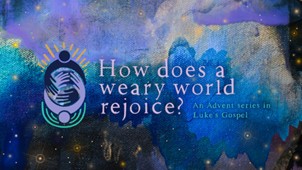
Joy is often a companion to many other emotions. We can feel joy in addition to feeling many other things at once: grief, anticipation, anxiety, excitement, disappointment, exhaustion. Perhaps many of us live with the myth that joy is not something we deserve—or that it is wholly out of reach. But our joy is rooted in the truth that we belong to God. Can you tether yourself to that deep truth? You deserve to feel joy—fully. The world needs your joy, even if you are weary. Our joy is better when it is shared.
This theme of course alludes to a line in the familiar Christmas hymn, “O Holy Night,” which has an interesting history. The song was originally written by a French poet who was atheist, and the music was supplied by a Jewish composer. The hymn was later translated into English by an American Unitarian minister. In the 1800s, it became a popular hymn for Christian abolitionists due to its justice-focused language in verse 3. Like Mary’s song, the hymn reminds us that justice and joy belong together. Sometimes our joy is an act of resistance.
And so, this Advent, we will hold space for our weariness and our joy. We will seek a “thrill of hope” in our hurting world. We will welcome joy—even and especially if, like the prophet Isaiah, we cry out for comfort (Isaiah 40:1). In this weary world, may we find many ways to rejoice.
FIRST SUNDAY OF ADVENT (DEC 3):
WE ACKNOWLEDGE OUR WEARINESS
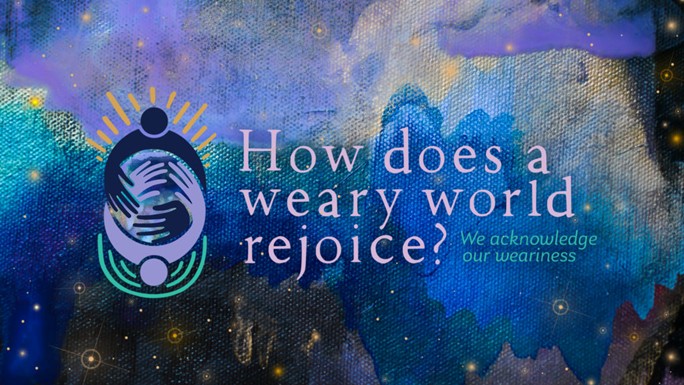
Luke 1:1-23 | Psalm 80:1-7, 17-19: As Advent begins, we start by acknowledging the weariness, grief, rage, and hopelessness we carry—and we also affirm that we are made for joy. Joy is designed to live in a full house of other emotions. We start the season with Zechariah and Elizabeth; they have battled infertility and have lived many years steadfast in their faith. Perhaps they feel the weight of hopes and dreams unattained. The angel comes to Zechariah with a promise of good news, but Zechariah can’t fully receive it, and he is cast into silence for the duration of Elizabeth’s pregnancy. Sometimes weariness can harden us and prevent us from living fully. We’ve had hard journeys. Grief has left a scar on us. This is how we show up to Advent. Let us acknowledge the ways we, too, are hardened by disbelief. Like the psalmist, let us ask, “how long?” and plead for restoration.
SECOND SUNDAY OF ADVENT (DEC 10):
WE FIND JOY IN CONNECTION
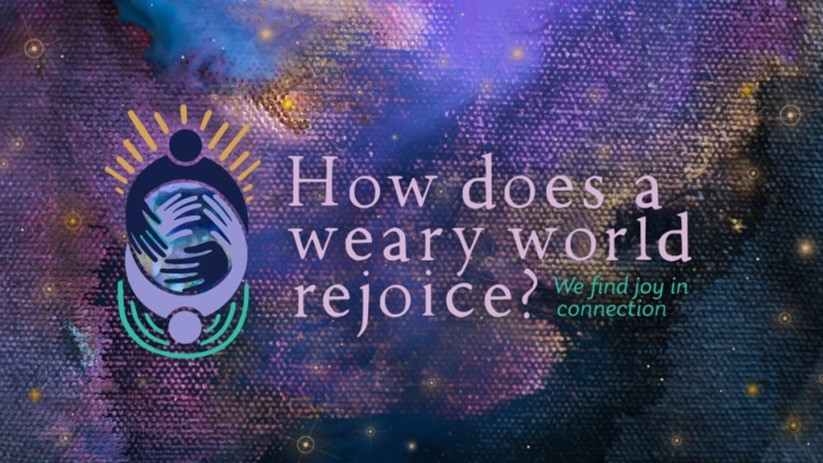
Luke 1:24-45 | Isaiah 40:1-11: In community, our joy expands. When we can’t rejoice, we can carry each other’s joy. That is what Elizabeth and Mary do for each other. The good news begins to take shape in Elizabeth’s womb, but scripture tells us that she stays secluded, hiding her pregnancy from others—that is, until Mary arrives at her door, also pregnant. Perhaps Mary’s arrival is the inbreaking that changes everything for Elizabeth, for in that moment, her child leaps in her womb and she is filled with the Spirit. She can’t help but to rejoice. Her joy is contagious and wraps around Mary like a hug. Through the prophet Isaiah, we hear God
THIRD SUNDAY OF ADVENT (DEC 17):
WE ALLOW OURSELVES TO BE AMAZED
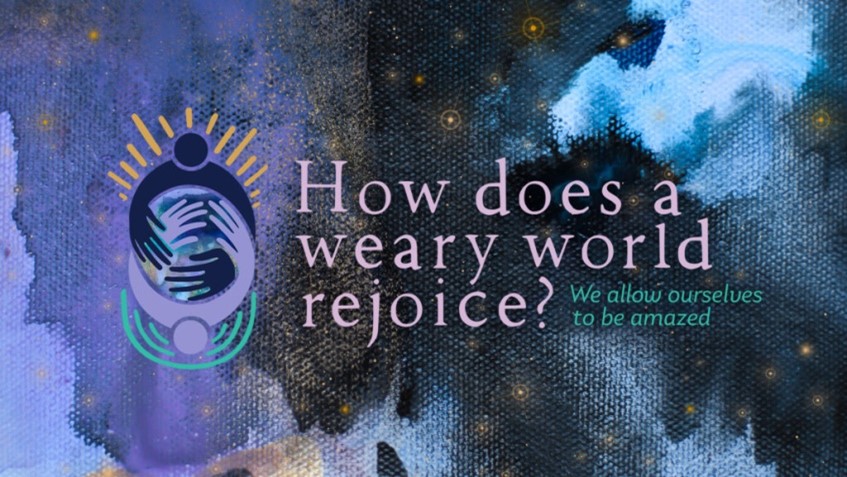
Luke 1:57-66 | Psalm 126: After Elizabeth gives birth, her neighbors and family celebrate with her. When it comes time to name the child, Zechariah affirms the name given by the angel and by Elizabeth. In that moment of affirming the promise, Zechariah’s speech is restored. Everyone is filled with awe. How often do you allow yourself to be amazed? Wonder is all around us—can we recognize it? As we learn how to rejoice in a weary world, can we live in a way that allows amazement and wonder to surprise us often? In Psalm 126, those who expect to reap tears are granted a surprise: shouts of joy. Amazement is a balm for the weary.
FOURTH SUNDAY OF ADVENT (DEC 24):
WE SING STORIES OF HOPE
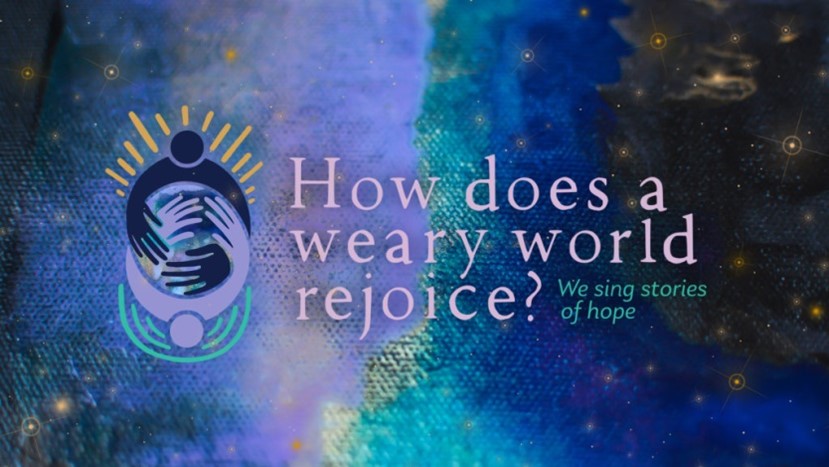
Luke 1:46-55 | Luke 1:67-80: As soon as Zechariah’s voice returns, his first words are gratitude and blessing. He sings a story of praise for God’s protection and promise, and then he showers a blessing on his newborn son. He sings a story of hope. After Elizabeth proclaims blessings upon Mary, Mary sings: “My soul magnifies God; my spirit rejoices in God.” Mary sings about a God of liberation who pulls the powerful from their thrones and lifts up the lowly. Mary sings a story of hope, one in which justice and joy are interwoven. As we prepare to celebrate Christ’s birth, may we also sing stories of hope, justice, and joy.
4PM & 8PM CANDLELIGHT CHRISTMAS EVE (DEC 24):
WE MAKE ROOM
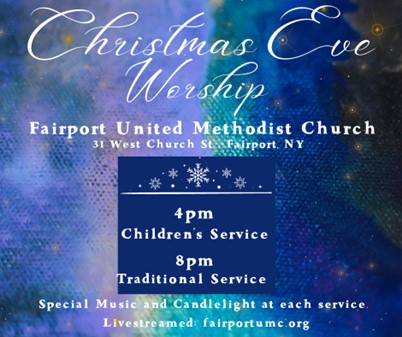
Luke 2:1-20: Luke’s Gospel tells us that when Mary gives birth to Jesus, she lays him in a manger, for there was no place for them in the guest room. Scholars argue about where, exactly, the birth occurs—and why. Was it in a stable or the living room of a simple peasant home? Was Bethlehem teeming with visitors who were also there to be counted in the census? Was Joseph’s family inhospitable because they disapproved of his marital situation? Regardless of where the birth occurs, we know that Christ is born in a crowded, unlikely place. And yet, God makes a place here anyway. God draws the circle wider as shepherds and unexpected guests arrive. This Christmas, let us also make room—for strangers and neighbors alike. For this is good news of great joy for all people.
9:30AM NEW YEAR’S EVE (DEC 31):
WE ROOT OURSELVES IN RITUAL
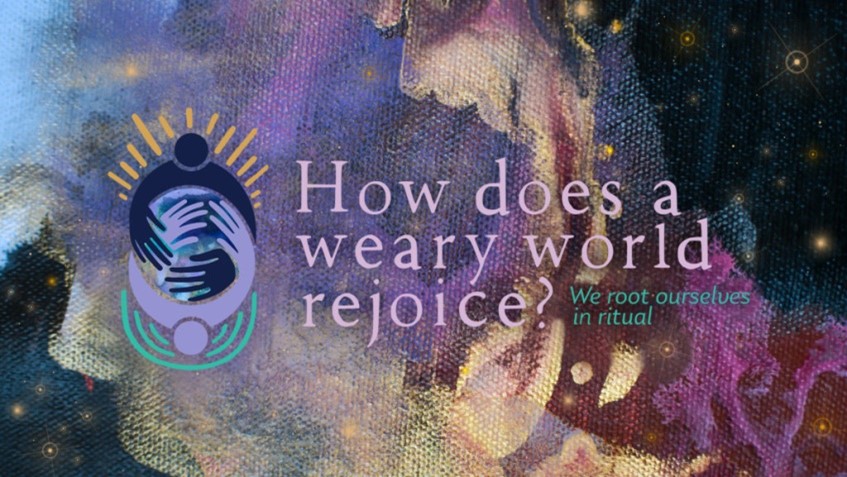
Luke 2:21-38: After eight days have passed, Mary and Joseph circumcise their child and give him the name Jesus. They return to the temple in Jerusalem to enact the sacred birth rituals of their culture and tradition. While they are doing what is customary, the unexpected occurs. A man named Simeon is led by the Spirit into the temple to proclaim Jesus as the “light of revelation.” Then, a prophet named Anna suddenly approaches them; she praises God and speaks about Jesus to everyone longing for redemption. Rituals mark sacred turning points in our lives. They can help us make meaning of celebrations, losses, and transitions. As new parents to Jesus, Mary and Joseph could feel weary for what lies ahead, but perhaps these sacred rituals—and those who bear witness to them—bolster them and give them courage for the journey. How do our sacred rituals root us and help us live into new chapters with courage?
